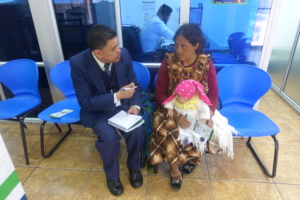How Important is Chinese Lending to Latin America?
Chinese lending to Latin America and the Caribbean hit an all-time high of $37 billion in 2010.

In Guatemala, remittances are an important source of income. In fact, the total stock of remittances reached $USD 8.192 billion in 2017, which is equivalent to around 75 percent of the total value of national exports.[1] This scenario makes evident the potential that remittances have to promote development. Thus, the Opportunities for my Community Project leverages remittances for development by creating partnerships with a variety of actors, including the private sector.
Opportunities for my Community promotes development in Guatemala through savings formalization and investments in the knowledge economy and education; thus linking remittances with development.
The project works hand in hand with a variety of partners. Together, the project and its partners share resources and risks, share information and technical knowledge, hold each other accountable, and work toward the long-term sustainability of the project. Partners involved in the project include families who receive remittances, diaspora groups, government entities, civil society organizations, schools, and the private sector.
Specifically, with the private sector, the project has been successful in engaging financial institutions in order to advance financial inclusion, including access to credit, and remittance companies in order to support education.

Financial education encourages people to plan their finances through budgeting and savings, helping them generate more economic wealth. The project, in partnership with Banco Industrial, Banrural, and seven cooperatives under the MICOOPE system, promotes financial inclusion through personalized education sessions. Over 100,000 financial education sessions have been provided. Results have been impressive: one out of four participants have gone on to open a bank account, increase their savings, or acquire another financial product, such as credit or insurance.
Moreover, these institutions help strengthen local entrepreneurs through the allocation of credits designated to support their business or commercial activities. The project assigns a business coach to each credit recipient in order to advise them on how they can improve their business strategy or administration. More than 150 entrepreneurs have participated in these sessions with positive results. For instance, some businesses have launched new marketing strategies, others have implemented new account systems, and others have issued hygiene licenses.
Given these successes, Opportunities for my Community is currently negotiating an alliance with the Ministry of Economy of Guatemala (MINECO), to share its methodology. This will allow more entrepreneurs to participate in departments throughout Guatemala. Ultimately, this would boost the competitiveness of Guatemalan small businesses while also creating more local jobs.
Strengthening education in communities with high emigration rates is also a priority for the project. Many schools collaborate with the project, so the after-school program can be taught in their classrooms. This program is delivered through the B’etil Diploma, which reinforces math and communication skills, as well as entrepreneurship abilities. Likewise, the private sector, represented by two remittances companies, Intermex and Viamericas, has also joined these efforts.
Intermex contributes economically to pay the salary of a teacher who is providing extra-curricular education for over 200 youth. Meanwhile, Viamericas has distributed more than 15,000 brochures in Washington D.C and Maryland, which share information regarding educational challenges in Guatemala. This material raises awareness among Guatemalan diaspora in the United States about the low levels of education in their country of origin and motivates them to invest in education.
“As a Guatemalan, I’m thankful for this information and would like to have more brochures to share. I believe that, with this, we can raise awareness, so more people support children in Guatemala, so they don’t have to go through what we did when we left” – Maynor Ramírez, Viamericas Maryland, USA
Thanks to all these alliances, the Opportunities for my Community project has an innovative model in which the private sector plays an active and essential role, contributing to improve the quality of life for many Guatemalans through financial inclusion and education.
Chinese lending to Latin America and the Caribbean hit an all-time high of $37 billion in 2010.
Venezuelan president Nicolas Maduro left China last month with a supposed show of support from the Chinese government.
Summary of PREAL’s recent international conference on teacher effectiveness, held in Guatemala City.
